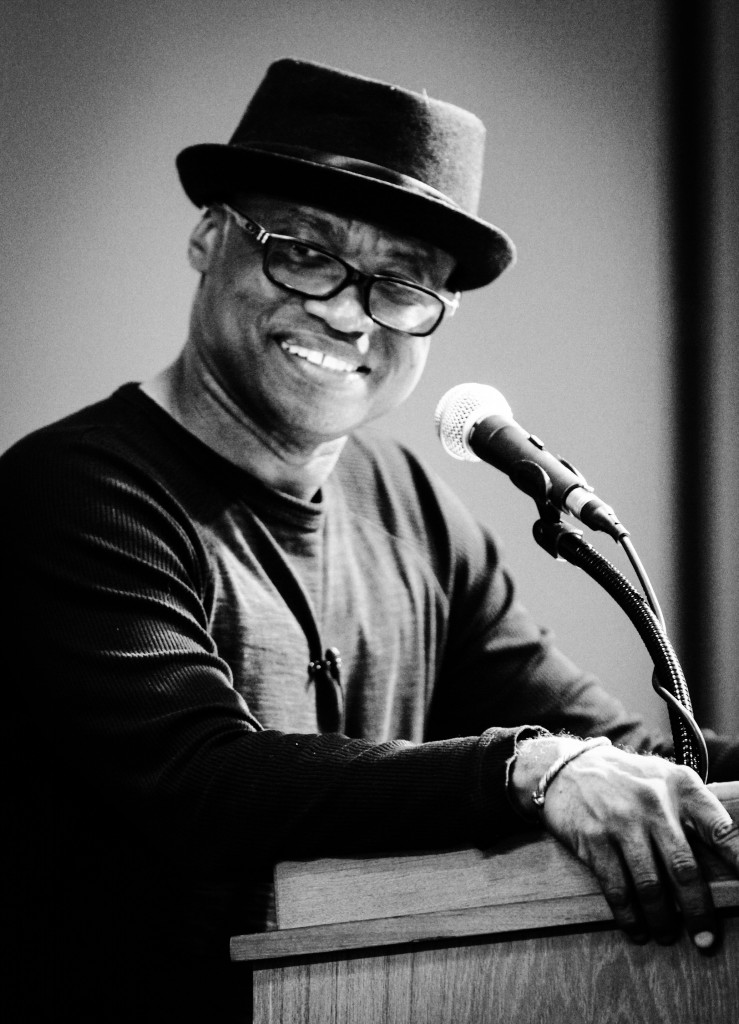Randall Horton: From Prison, to Poet, to Professor
 The poet and professor, Randall Horton. © Paula Martali
The poet and professor, Randall Horton. © Paula Martali
A Reoccurring Nightmare In Maximum Security
BY RANDALL HORTON
it begins where moonlight ends
slipping through the horizontal
window, wraps each iron bar
of the prison you have become
a longer extension of the cell
in which all humans are born,
come into screaming. scream
& the high shrill falsetto,
voice you never ever want
echoes, ripples, bangs against
your anvil. awakened night-
mares turn mute, the jangling
keys, the slow drag boot heel,
the black scuff marks. you can’t
see yet the guard & the guard
will not see juvenile johnny
sprawled over the bottom bunk
like an elegant woman he is not.
stop. but no one will. stop
receding scenarios dubbed
over & over & over & over.
BY SALLY-ANN HARD | THE IMPRISONED ISSUE | WINTER 2014/2015
Randall Horton’s poems are the work of a knowing, compassionate witness. He lays out reasons why we should care, why we should be moved to action and why our treatment of people who are imprisoned is an indictment against our moral, ethical and societal values. Writing, in part to relieve the guilt of the choices he made in his own past, his poems ask us to question what kind of justice we have.
We need these poems.
Horton can write about imprisonment—the inhumanity, deep loneliness, daily degradations and isolation—because it was his life for five years at the Roxbury Correctional Institution in Maryland and for almost two years at the Fairfax County Detention Center in Virginia. Prior to being imprisoned, Horton had never written. He was thirty-eight years old when he started writing. While behind bars, he attended a writing workshop, which piqued his interest. After reading an interview with the poet E. Ethelbert Miller about his memoir, Fathering Words, Horton wrote to him, beginning a correspondence that led him to delve deeper into the world of poetry.
Since being released in 2001, Horton has earned a Ph.D. in English/Creative Writing, from the University at Albany-SUNY, received notable poetry prizes, and a National Endowment for the Arts Literature Fellowship. His publications include a memoir, Roxbury, and the poetry collections, The Definition of Place, The Lingua Franca of Ninth Street, and his most recent, Pitch Dark Anarchy. And in May, Augry Books will publish Hook: A Memoir. He is now an Assistant Professor of English at the University of New Haven, Connecticut where he often speaks to his students on the impact of imprisonment. It is a most necessary education. Many of them are enrolled in the university’s Criminal Justice Program.
Running throughout Horton’s writing, is an intention to be true to his own story by giving breath and life to experiences many of us cannot understand. In his poem, “When A Man Leaves A Woman Unprotected,” Horton illuminates the consequences imprisonment visits on entire families and communities, particularly poor communities of color.
……………………………………“life
on the installment plan, three years in
prison, three months on parole; then
……………………………………back
to start all over again…” she lives without
a blanket, the safe cuddle she craves—him
We are made aware of what happens when people are disconnected from their loved ones and their neighborhoods, when men are not there for their women, for their daughters.
…………………………………….pacing
angles in his cell will come to know regret,
absence, his daughter’s post trauma
……………………………………every night,
even his woman having to be the man,
emasculation damn near complete.
In other poems, Horton introduces us to a mosaic of men who know the brutal reality of life behind walls and the collusion of the keepers and the kept. In “The Big Payback (for Dequan),” he writes:
………………………….homie
can’t be called. No one to save you
within razor wire built to breakdown
……………………the wretched—
And from “Fact: Ten Minutes Can Be A Long Time”:
Fact: There is something about power in fingertips of the insecure
I lay motionless on the bunk.
My metal shelf displays books
To help break out
The four corners I call home.The pages and I are conjoined.
The guards know this.
They domino my books to the ground.
I want to cave jaws, but I stay cool.
Some of my own poems were written for a man I knew well. A man who spent almost twenty years in prison and, after his release, fought hard, every meal, to use a knife and fork instead of a spoon. Deprived for so long of the routines of daily life, he had to relearn how to live outside prison walls. That relearning included simple things like using a knife and fork. When I visited him at the State Correctional Institution at Graterford, Pennsylvania, I witnessed many of the ritual humiliations of life behind bars. Enforcing the “one kiss in, one kiss out” prison regulation, guards would scream derisively at prisoners if they considered someone a transgressor. The man I was visiting was verbally assaulted, called stupid and an idiot by a guard because he his lips lingered too long on mine.
Bearing witness to these things heightened my awareness of, compassion for, and righteous anger about the lives of people who are imprisoned as well as the injustices of the system. So, when I met Horton at a poetry workshop in 2007, I felt a connection to him and his work. His poems articulate things I had rarely seen on paper. They offered a view of life in prison by someone who, unlike me, was not free to leave at the end of a visit. His words are an insistent and necessary reminder for me to honor the man I knew and to expose the degradations of people who are prisoners. His poems speak the words the man I knew would have spoken.
“A Reoccurring Nightmare In Maximum Security” and excerpts of “When A Man Leaves A Woman Unprotected,” “The Big Payback (for Dequan)” and “Fact: Ten Minutes Can Be A Long Time” republished by permission of the poet, Randall Horton.
♦
Sally-Ann Hard is a poet. As a volunteer, she has also taught job readiness at Rikers Island Jail in New York City to people about to be released. Finishing Line Press published her chapbook, Alphabet of a Nomad, in 2014. A poem about a man she loved, who spent twenty years in prison in upstate Pennsylvania, was nominated for a national poetry prize. It is in his name she commits her energy, passion and expertise to helping people who are, or who have been, in prison.
OF NOTE Magazine is free to readers, free of advertising, and free of subscriptions—all made possible by generous supporters like you. Your tax tax-deductible gift will help us continue to feature innovative and emerging global artists using the arts as tools for social change. OF NOTE Magazine is a fiscally sponsored organization of the New York Foundation for the Arts, a 501 (c) (3), tax-exempt organization. All donations are 100% tax-deductible to the full extent of the law.


